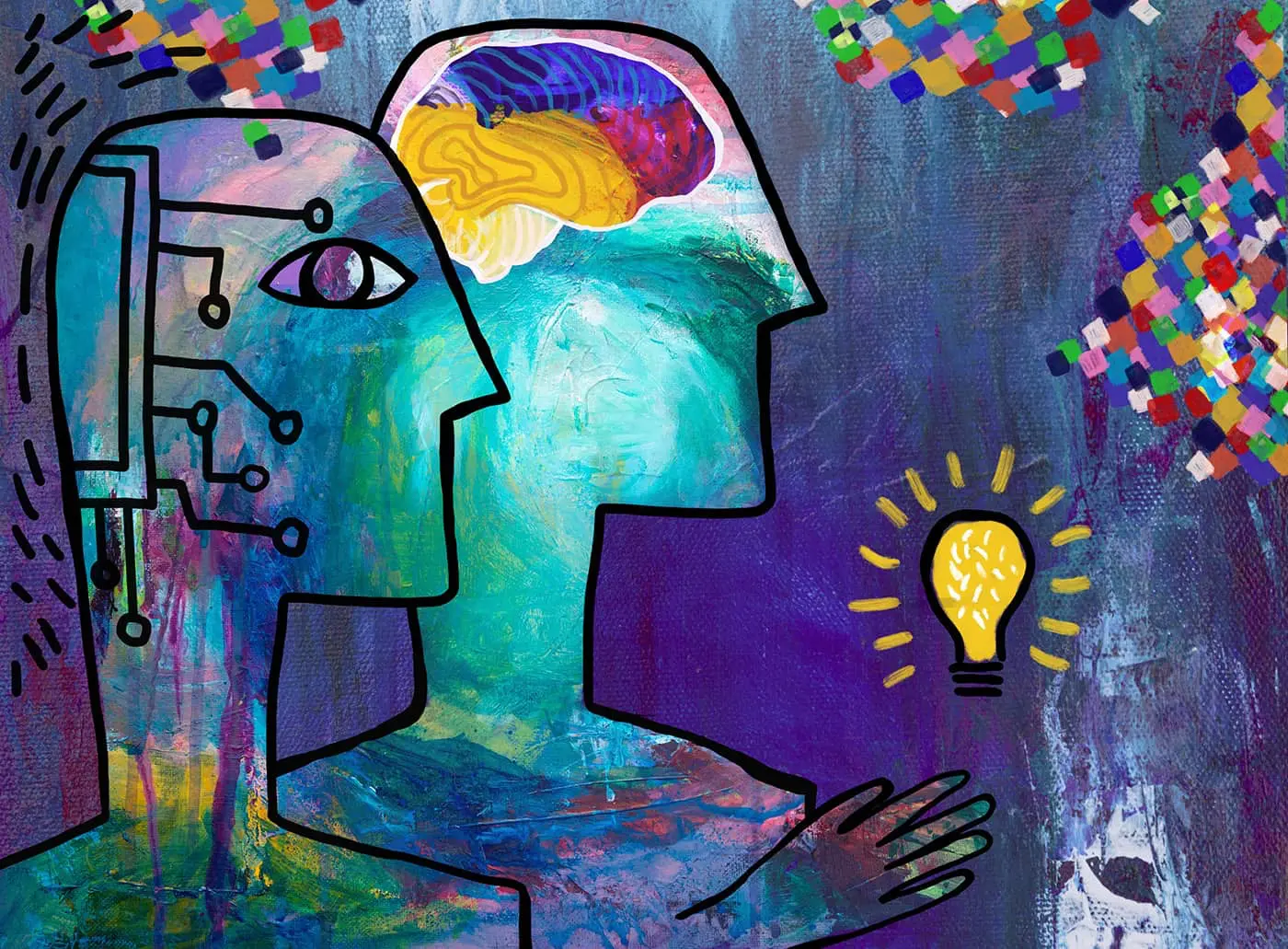AI in sales: view from our experts
19th September 2024 | Journal Of Sales Transformation

Sales professionals and academics discuss the current state of AI in sales, and look to the future.
Bob Apollo, Chief Outcomes Officer, Inflexion-Point

As we approach the era of AI in business and sales, it is vital to explore what the key tasks will be, as well as the skills and development paths needed to make a success of the technology.
What will salespeople’s key tasks be?
To ensure that the inputs provided to AI-enabled tools are as accurate and complete as possible.
- To take the raw outputs generated by AI-enabled tools, to refine them. and then to apply their own experience and judgement.
- To use the outputs of AI-enabled tools plus their own judgement and experience to guide their customer interactions.
- To critically evaluate the guidance provided by AI-enabled tools in determining their sales strategies and tactics.
What will their key skills be?
- Salespeople will need to be highly effective in prompting AI-enabled research tools.
- The effective application of AI-enabled tools will require highly developed critical-thinking skills.
- Salespeople will need to take the outputs of AIenabled tools and apply their own judgment and experience.
- Conversational skills, emotional intelligence and the ability to “stay in the moment” will be even more important than they are today.
What development paths will need to be in place?
- When recruiting new salespeople, we will need to assess their critical-thinking skills, emotional intelligence and their track record of applying AI in their previous roles.
- Training and coaching programmes will need to develop our existing salespeople’s critical thinking skills and their ability to harness AI-enabled tools.
- Sales teams will need to continuously collaborate to come up with effective AI prompts and create “starter” templates.
Bob Apollo is the founder of Inflexion-Point Strategy Partners, the outcome-centric selling experts.
Dr Frank Cespedes, Senior Lecturer at Harvard Business School

Artificial Intelligence (AI) is now a loose term for many different things. But the promise at the heart of AI is that the tools can do a task nearly as good or better than people, freeing up time for people to do what they do best. Here are two places where AI can help:
Customer contact time. Estimates are that most salespeople spend only 30-35% in customer contact, and this includes emails, phone calls and webinars, as well as virtual or in-person meetings. Consider the impact of increasing time spent prospecting or selling/servicing current customers by an incremental 10-20%. In most firms, that’s a big productivity boost and it increases TAM, because economically infeasible segments become feasible with better go-to-market utilisation.
AI tools can save much time in content marketing, personalising emails, and helping salespeople find information about the industry, company and people they meet. Then, other AI tools can help reps practice relevant sales conversations when that is most helpful.
Lead generation and qualification. In most firms the selling cycle is the biggest determinant of time-to-cash, working-capital requirements, and funding needs. Higher interest rates mean higher costs of capital, and longer selling cycles increase the costs of false positives in the pipeline. Especially in B2B markets characterised by multiple RFPs and pre-sale customisation requirements, lead-qualification ability is crucial to allocating available sales resources wisely.
AI tools can help marketers and salespeople understand traits common to your current “best” customers, identify segments that have been overlooked, and use that information to generate (via AI) tailored content, posts, landing pages, and outreach questions that improve lead qualification. And all of this with less human effort and, over time, reduced cost-to-serve.
But no benefits are available without good sales management practices in certain core areas.
AI tools depend upon the data inputs and, in sales, usually data from the CRM system. This is noisy data in most firms – not because of the software, but the human inputs. Different salespeople interpret “lead… qualified lead… probability of purchase” differently, and CRM simply aggregates those diverse, subjective inputs. The biggest time and expense is not buying AI tools, but cleaning-up and keeping the data inputs relevant.
And that’s a management issue, not a technology issue, because good data in sales depends upon performance evaluations and ongoing account reviews. Much key information about buying criteria is lodged in the heads of account managers and only becomes visible and an input to an AI tool after a good performance or account review. When busy sales managers do sloppy or drive-by reviews, they not only perpetuate a culture of under-performance, they also inhibit the flow of key market data and make irrelevant their firms’ investments in technology.
What’s a key skill and developmental issue in the age of AI? The low-tech but crucial skill of doing good performance reviews.
Frank Cespedes teaches at Harvard Business School and is the author of six books, including Aligning Strategy and Sales and Sales Management That Works.
Dr Grant Van Ulbrich, Global Director, Sales Transformation, Royal Caribbean Group

While AI is rapidly advancing in technology, not every company is embracing the ability or need to openly allow AI into their organisations.
Inserting or using corporate data into open AI portals like ChatGPT and others is still a very valid concern of most organisations. The issue surrounds open AI’s ability to learn and adopt key corporate data and information and potentially allow internal data to get out into the open public.
Valuable AI CRM resources like Salesforce are embracing AI and forcing organisations to start down the journey. However, this will be a tale of caution and small steps before a fast adoption by many will be taken. That said, even with the advanced benefits that AI can bring to shorten and reduce a seller’s administrative tasks alone being quite beneficial, the salesperson must still hold critical skillsets and value relationships in order to drive trust, integrity, and facilitate a long-term gain versus a short-term AI task-based interaction.
What will salespeople’s key tasks be?
Key tasks for AI use can be to reduce/eliminate administrative tasks such as email generation, social media and marketing scripts, points, discussion topics, data and comment analysis, and instant help with knowledge and information-based needs.
What will their key skills be?
Sellers must maintain and upskill in negotiation, relationship, proactive creativity, and tactful audacity whilst maintaining full authenticity. They must also upskill in digital and technological sales and CRM support, ways of working, guidance for themselves and for their customers.
What development paths will need to be in place?
The consultative sales tips and tricks to manipulate a seller taught from the 1980s into the 2010s are no longer valid. Salespeople can and should invest in sales educational programmes such as undergraduate, graduate, post graduate and certificate-driven programmes exclusively for the sales career pathway. Learning the true science and psychology behind sales and the way modern customers want to be sold to can prepare them for a fulfilled career.
Joining and partnering with sales CPD for continued professional development is also critical. Don’t be stuck in a one-time learning scenario and think you are done. Sales is advancing just as the world is. You need to stay educated and connected.
Grant Van Ulbrich is Global Director, Sales Transformation, Royal Caribbean Group; Chief Research Officer, Scared So What community interest company; and a contributing author to Transformational Sales Leadership: Sales Leader Perspectives.
Scott Waugh, Head of Sales and Account Management, Thales

“According to Gartner, 60% of sales tasks will be undertaken by AI by 2028.” I cannot disagree with this statement since AI is an advanced form of automation, meaning ordinary “enhanced manual tasks” like making a report, building presentation slides, even writing proposals can be further automated and augmented with an AI engine. This frees up the sales manager to be doing more of the creative, soft skills work that is oftentimes considered to be superfluous compared with “managing the CRM data accuracy” (another future AI task).
What will salespeople’s key tasks be?
As customer and sellers both automate their desks using AI tools, there will be more capacity to spend time creating innovative solutions to business challenges.
In B2B, capital expenditures (£100k+) could change the way they are competed. Not one organisation can be a onestop- shop solution provider, now or in the future. The need for the supply chain to cooperate will increase. Sellers – or Business Developers or Business Champions – will form customer-partner alliances, where teams of suppliers and customers will come together to create the solutions. The traditional binary sell will advance into complex competitions where corporate innovation-based pitching is required to get shortlisted onto the consortium for a “project”.
Sellers will be interfaces between customers and organisations. They will need to manage many moving parts both internally and externally with customers, supply chain partners/channel partners, SMEs, advisers, and other stakeholders such as government, regulators, academia.
What will their key skills be?
Sellers will need to be very multi-functional, self-reliant, resilient and innovative. I see a Professional Seller having more cross-functional acumen and being very self-reliant – specifically:
- Project management knowledge – Understanding and use of Earned Value Analysis/Cost control, Delivery/Quality/Contract management.
- Commercial – Negotiate T&Cs, understand contract law, risk analysis, governance, export control, in-country legal limitations, IP.
- Sales – Self-starting, negotiate the mutually beneficial deal, pitch and position the organisation’s innovation (not necessarily a product – it could be selling R&D expertise based on number of past patents filed).
- Technical – Be a seller-doer, have the lingua franca of the domain the Seller operates in, know the industry and be able to influence thinking.
- Psychology – Have exemplary emotional intelligence, feel and empathise with people deeply to build trusted relationships across the market.
- Marketing/communications – Sellers will need to also be Brand Ambassadors able to kick-start engagements to position their organisation positively, canvassing for votes where other organisations and customers desire working with you and your brand on the next consortium pitch.
What development paths will need to be in place?
Sales has the capacity to be professionalised: not to create constraints, increase costs or add governance. Moreover, to professionalise the Sales/Business Development function much like Finance, HR, or Engineering sends the message the Seller has attained a level of professional qualification, experience, and conduct akin to a director-level of accountability in and of the company. See the Seller as the organisation’s brand ambassador and their actions, values, motivations are aligned with the mutual benefit of their organisation and your organisation. The good sellers understand the psychology of the sale. They have the selling DNA that is thick with emotional intelligence.
A salesperson working with a high-value client will spend time understanding their business challenges and personal preferences to build a strong, trust-based relationship.
I can envisage professional training/academic courses made available that combine the abovementioned skills into a Professional Seller qualification – much like an MBA for Sales – that is globally recognised like CIPS or CIMA.
Organisations would be wise to develop those Sellers who lead with strong emotional intelligence above the desire to earn money – this is somewhat counter-intuitive to today’s measurements of success. Sellers operating from a strong value system will attract wealth and success in all they do, because they understand they’re doing the right thing for the customer and society as a whole.
There will be strong competition in every market. The niches will be fewer with innovative organisations jostling for position in saturated markets. For Sellers, strong EI, intuition, and mental resilience will be necessary to “stay the course” in the future. Equally important will be the ability to be agile, fastof- mind, to keep pace with speed of change as organisations use AI-driven decisions as competitive advantages – forcing the competition to make minute-by-minute manoeuvres. Bootcamp-style mental health training may help develop that fortitude required to drive innovative, knowledge-based selling methods, and keep cadence with the market evolutions.
Scott Waugh is Head of Sales and Account Management Cyber Digital Solutions UK, Thales.
Waldemar Adams, Global Senior Vice President, SAP Customer Success COO Office

There’s no doubt AI will cause – or accelerate – change. It’s like in the industrial revolution when machines replaced the need for everything to be hand-made. Mass production was established but there was still a need and market for handmade and high-quality manufacturing.
When I think of chatbots on websites, I would argue that 60% of the very “basic” sales tasks are already replaced. At the same time, AI is used to make recommendations in online shops like Amazon; this is doing a great sales job for them. However, if we consider spam, it is huge and is, by definition, a mass sales approach (and can be considered the dark side of sales). However, to send one million emails doesn’t cost a lot and, if 1% is buying the stuff, they get rich. However, my view is that skills have always beaten the “mass-production sales approaches” like these.
In terms of the effect of AI on jobs, perhaps this is less important in developed countries where the population is shrinking. However, we should consider the effect on bluecollar workers as well as so-called professionals. White-collar jobs will not be immune because many of them can be highly automated, given that they are based around rules that are relatively easy to implement: tax advisers, lawyers, salespeople for certain goods, engineers in certain industries.
Hannah Fry (an Associate Professor in the mathematics of cities from University College London) wrote a brilliant book, Hello World: How to be Human in the Age of the Machine, with a focus on ethics and behaviour. My thoughts around key tasks, skills and development paths should be viewed through the lens of “Sales in the Age of AI: A Human-Centric Approach”.
What will salespeople’s key tasks be?
- Relationship building and trust cultivation (my number one) – Human salespeople understanding client needs on a deeper level, and fostering long-term relationships, crucial for large investments (in my case enterprise software, but also expensive machinery, factories, and so on).
- Focus on strategic initiatives – From what I see, AI won’t replace the strategic thinking needed to develop targeted sales plans and navigate complex customer buying journeys (again especially for high-value goods like enterprise software, etc).
- Managing complex sales cycles – High-value goods often involve multiple decision-makers and lengthy sales cycles. Skilled salespeople will manage these processes effectively, anticipating objections and guiding clients through the buying journey. This is even more important when you deal with humans as decision makers. There are also buying platforms (like Ariba from SAP, but also auctions for placing ads in social media feeds) which are highly automated – in such cases, machines are selling to and buying from machines.
- And to add a fourth which is not 100% relevant, Negotiation and deal structuring – Crafting customised solutions, negotiating win-win deals, and navigating complex contracts will remain core tasks for skilled salespeople, particularly in high-value scientific instruments or research services. Again, for lower-value or highly standardised goods this is not so important as you have standard deals, licences, and a take-it-orleave- it approach. It’s not the same for high-value products.
What will their key skills be?
- Deep industry knowledge or scientific expertise – Salespeople will need a strong understanding of the given industry or research landscape, relevant technologies, and how their products solve specific customer-related challenges. For SAP, the industry focus has a long tradition. We already have sales which are focusing on only one of 23 industries and subindustries we defined.
- In relation to my number one (above), active listening and empathy – Understanding the specific needs and pain points of customers/their human contacts will be key in building trust (again!) and proposing relevant solutions.
- Excellent communication and presentation skills – Conveying complex information clearly, articulating the value proposition effectively, and tailoring presentations to diverse audiences will be critical.
- Problem-solving and critical thinking – High-value sales often involve bespoke solutions. Salespeople will need to analyse complex problems, identify creative solutions, and adapt their approach to unique client situations. This also relates to the issue that AI models usually derive output in strong correlation to the input. Problem-solving also requires us to do things the “first time”.
What development paths will need to be in place?
- If the human factor is the (current) missing link for AI, let’s start with communication and presentation skills coaching. Storytelling is high on my list of required “skills”. Also, the first data analysis from my current doctoral studies highlights people’s expectations on communication.
- See the above list of key skills for industry-specific or area-specific training.
- If handling complex deals is your competitive advantage versus AI, you well advised to invest in negotiation and deal-structuring skills development.
- Finally, training in AI and data utilisation – Salespeople should understand how AI can complement the sales process, leverage data analytics to identify ideal customers, and personalise outreach strategies. Going forward, just as computers provided high-speed calculation to break the limitations of human calculus brain power and helped set our minds free to achieve what was formerly impossible, AI is another of those tools. Highly skilled professionals (including in sales) will harness AI as a powerful option in their arsenal, in the same way they embraced the calculator or phone in previous decades.
Waldemar Adams is currently pursuing his doctoral studies at Middlesex University.
Sam Richter, Founder, Intel Engine & SearchLink

AI is poised to revolutionise the sales industry by taking over many repetitive and time-consuming tasks via automation. AI will efficiently handle activities such as data entry into CRMs, industry research, sales coaching, and practice questions.
For example, AI can quickly analyse large datasets to identify potential leads, automate follow-up emails, and provide real-time analytics on sales performance. Additionally, AI-driven chatbots can assist with initial customer inquiries, freeing up sales professionals to focus on more complex interactions. By 2028, many of the data systems that sellers use will be integrated, creating massive efficiencies in the sales process.
However, the nuanced understanding of customer needs and the provision of tailored solutions will remain the domain of skilled sales professionals. In an AI-driven world, the role of the salesperson becomes even more critical when it comes to building genuine human connections. Meeting in person, over the phone, or virtually allows salespeople to establish trust, read body language, and respond to emotional cues – capabilities that AI currently cannot replicate. Human interaction is essential for addressing unique customer concerns, negotiating deals, and fostering long-term relationships.
The integration of AI in sales will not diminish the importance of human connection but will instead amplify it. Sales professionals will have more time to engage in meaningful conversations and provide personalised solutions, making their roles more strategic and customer-centric. This blend of AI efficiency and human insight will enhance overall sales performance, allowing salespeople to focus on building deeper customer relationships and crafting personalised strategies, ensuring that they remain indispensable in the sales process.
Emotional intelligence, creativity, and deep customer understanding
Generative AI excels in handling repetitive and time-consuming tasks, such as data entry, industry research, and preliminary customer engagement. For instance, AI can automatically populate CRM systems with relevant customer data, identify and prioritise leads based on predictive analytics, and generate personalised email campaigns. Additionally, AI tools can provide real-time coaching to sales reps, offering suggestions for improving pitches or handling objections based on data analysis.
However, while AI handles these routine tasks, the role of skilled salespeople becomes even more important in areas requiring emotional intelligence, creativity, and deep customer understanding. For example:
- Building trust and rapport – AI can initiate contact, but building trust and rapport with customers requires human interaction. Sales professionals can use empathy and active listening to understand customer needs, concerns, and aspirations. These personal connections are essential for fostering long-term relationships and customer loyalty.
- Complex negotiations – While AI can provide data-driven insights and recommendations, complex negotiations often require human judgment, flexibility and interpersonal skills. Skilled salespeople can navigate the nuances of negotiation, adapting their approach in real-time to address the specific needs and objections of each customer.
- Tailored solutions – AI can analyse customer data to suggest potential solutions, but only a human salesperson can fully grasp the unique context of a customer’s situation. By understanding the specific challenges and goals of each customer, sales professionals can craft bespoke solutions that address their needs more effectively than any automated system.
- Emotional cues and body language – In face-to-face or virtual meetings, skilled salespeople can read emotional cues and body language to gauge a customer’s reactions and adjust their approach accordingly. This ability to respond to non-verbal communication is critical for maintaining positive interactions and building trust.
- Strategic insight and creativity – AI can process vast amounts of data and identify patterns, but strategic insight and creativity come from human experience and intuition. Sales professionals can use AI-generated insights as a foundation to develop innovative strategies and creative solutions that differentiate their offerings in the market.
As AI continues to evolve and integrate into the sales process, the role of skilled sellers will not diminish but will transform. Sales professionals will increasingly focus on activities that require human touch, judgment, and creativity, making their contributions even more valuable. The future of sales lies in the seamless collaboration between AI’s efficiency and the nuanced capabilities of human sellers, ensuring that customers receive the best of both worlds.
As the role of the salesperson continues to evolve, “order takers” will disappear as those tasks will be replaced by AI automation. “Farmers” who today might not sell that much – rather, they exist to ensure a client is happy and receiving the support they need – will also have to evolve, as many “farming tasks” such as checking inventory, making sure parts are always available in the pipeline, answering product questions, and so on will also be replaced by AI. “Hunters” (those whose time is spent prospecting for new business) will also evolve. They will have more access to data and will have a much better understanding of who to call on, based on activities – or sales triggers – occurring in the prospect’s world.
Overall, AI will help the salesperson better identify the right opportunities, the right decision-makers, at the right time when the prospect needs the salesperson’s solution, with the right message. Being relevant and provide personalised value will become more important.
Specifically, a salesperson’s role will evolve and here are some detailed looks at their possible future:
What will salespeople’s key tasks be?
Sales professionals of the future will be tasked with building trust and rapport, managing complex negotiations, creating tailored solutions, and maintaining high-quality data. AI tools will handle repetitive tasks, allowing salespeople to dedicate more time to developing meaningful customer relationships. For instance, a salesperson working with a high-value client will spend time understanding their business challenges and personal preferences to build a strong, trust-based relationship. This personal interaction is irreplaceable as the role of the “human touch” in building long-term business relationships based on relevance becomes the key to differentiation.
What’s a key skill and developmental issue in the age of AI? The low-tech but crucial skill of doing good performance reviews.implications.
Complex negotiations will also remain a key task for sales professionals. During contract negotiations, a salesperson might use their understanding of the client’s needs to craft a highly customised agreement, leveraging AI-suggested options but finalising the deal through human intuition and flexibility. For example, an AI tool might suggest a pricing model based on data trends, but the salesperson will need to adjust the offer based on the client’s unique financial constraints and preferences. While AI can support negotiations by providing data insights, the nuanced art of negotiation requires human intervention.
In addition, salespeople will be responsible for tailoring solutions and engaging in strategic planning. Using AI analytics, a salesperson can identify a customer’s pain points and design a custom solution that addresses those specific issues. For example, AI might reveal that a customer is struggling with supply chain inefficiencies, prompting the salesperson to propose a tailored logistics solution. While AI can identify patterns, only skilled salespeople can turn those insights into actionable strategies. Of utmost importance will be for the salesperson to have a healthy level of scepticism when using AI, and in particular, Generative AI. Ensuring the accuracy of data entered into CRM systems will be critical, as the reliability of AI predictions hinges on high-quality data and Generative AI will “make up” an answer – and present that answer in a very confident manner – if the underlying data is not present. Meeting capturing tools will need to be employed to update a CRM system after every customer interaction to ensure AI tools have the most accurate information. The adage “garbage in, garbage out” might be more important than ever.
What will their key skills be?
The sales professionals of the future will need a blend of technical proficiency, analytical skills, emotional intelligence, and strategic thinking. They must be adept at using AI-powered tools for lead generation, CRM management, and analytics interpretation. For example, salespeople will need to operate AI-driven CRM systems, interpret data from AI analytics tools, and use automation software to streamline follow-ups.
Analytical skills will be essential for interpreting AIgenerated insights and making informed decisions. For instance, a salesperson might use AI to analyse customer purchase histories and predict future buying behaviours, allowing them to anticipate and meet customer needs proactively.
Emotional intelligence will remain critical for building strong relationships with customers, understanding their needs, and responding to their emotional cues during interactions. For example, reading a customer’s body language during a video call and adjusting the sales pitch accordingly can make a significant difference for connecting with customers on a deeper level.
Strategic and creative thinking will also set top salespeople apart in an AI-driven world. They will need to develop innovative strategies and solutions that differentiate their offerings from competitors. For example, a salesperson might use AI insights to develop a unique value proposition that addresses a market gap identified through data analysis.
What development paths will need to be in place?
Today and moving forward, all of us are living in a world where change is happening at a speed never seen before in human history. As customers will be relying on their vendors and salespeople to be the experts, continuous learning and training will be imperative for sales professionals to stay updated with technological advancements.
Sales organisations will need to provide ongoing training programmes focused on new AI tools and data analysis techniques. Continuous learning is essential for sales teams to adapt to technological changes. For instance, regular workshops on the latest AI-driven sales tools can keep the team proficient and competitive.
Mentorship and coaching will play a vital role in developing the skills of sales teams. Experienced sales professionals can mentor newer team members, sharing insights on effective customer interaction and advanced negotiation tactics. A practical approach might include pairing new hires with seasoned sales mentors for hands-on learning and guidance.
Certifications and formal education in AI tools, data analytics, and customer relationship management will further boost the credibility and effectiveness of sales professionals. For example, obtaining a certification in AI-driven CRM tools can provide a competitive edge.
Practical experience combined with regular role-playing exercises and real-world practice scenarios will help hone skills in negotiation and customer engagement. Regular roleplaying scenarios and ongoing coaching where salespeople practice complex negotiations can prepare them for real-world challenges.
Sam Richter is a keynote speaker and best-selling author.

